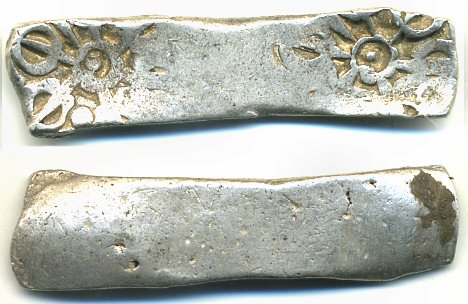

An example of what was very probably the earliest Indian coin: a large silver shatamana (double siglos or bent bar) issue, Gandhara, c.600-500 BCE (43mm long, 10mm wide)
Source: ebay, May 2007

A closer view
Source:
http://www.vcoins.com/ancient/pegasi/store/viewitem.asp?idProduct=4738
(downloaded Nov. 2007)

Another example of this kind of coin
Source: http://www.grifterrec.com/coins/india/ancientindia.html
(downloaded May 2007)

These coins came in a shorter, wider shape also
Source:
http://www.vcoins.com/ancient/ecin/store/viewitem.asp?idProduct=6038
(downloaded Nov. 2007)
"Taxila, Short Silver Satamana Bent Silver Bar, c. 600-303 BC. One of the earliest coins in the world, these silver bent bars were mentioned when the King of Taxila paid off Alexander the Great. This type is somewhat scarce. Size: 25 mm."
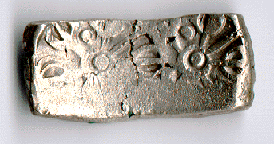 |
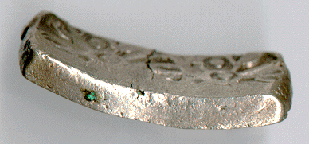 |
And one more example, showing the curvature these coins often had
Source: http://www.med.unc.edu/~nupam/ancient1.html
(downloaded May 2007)
*Punchmarked coinage of the early Kingdoms, Gandhara - Mauryans (6th c.BC - 3rd c.AD)**, a research page from Ancient Coins Canada
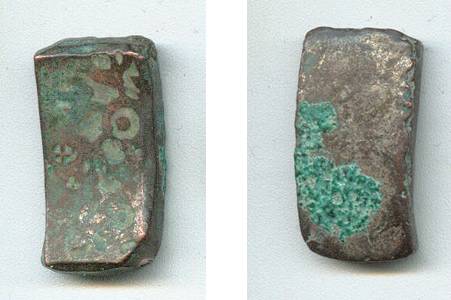
A punchmarked bar coin of the "short debased" type from the mint at Taxila, c.450 BCE
Source:
http://www.vcoins.com/ancient/ecin/store/viewItem.asp?idProduct=2315&large=1
(downloaded Oct. 2006)
"Taxila Bent Punchmarked Bar c. 450 BC. Billon Debased Early Type.
Crude
fine, with some adhesion. Size: 24 mm.Weight: 11.20 grams."
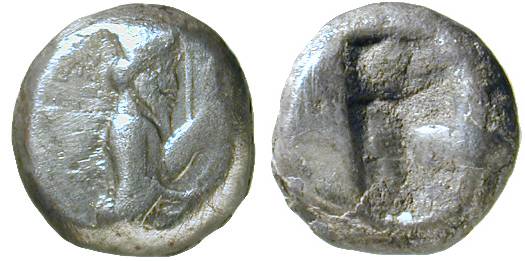
A Persian siglos coin from the time of Darius I, and bearing his portrait; Gandharan coins were calibrated to the siglos (see the research site above)
Source:
http://www.vcoins.com/ancient/frankkovacs/store/viewItem.asp?idProduct=1088&large=1
(downloaded Sept. 2006)
"Persian Kingdom. Darius I, 521-486 BC. AR. siglos of Sardis (5.20 g). Half-length figure of the Great King r. / incuse punch."
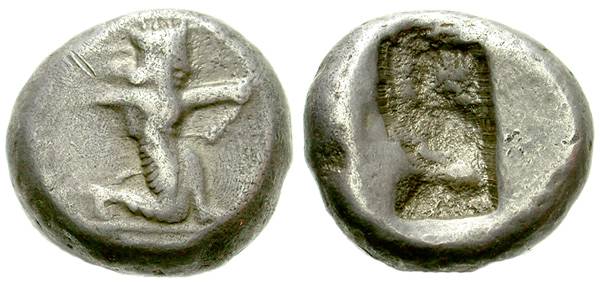
Another early Persian siglos coin probably from his reign, c.505-480
Source:
http://www.vcoins.com/ancient/bpmurphy/store/viewItem.asp?idProduct=4747&large=1
(downloaded Sept. 2006)
"Achaemenid Empire. Circa 505-480 BC. AR Siglos - 14mm (5.34 g). Persian king or hero in kneeling/running stance right, drawing bow / Incuse punch."
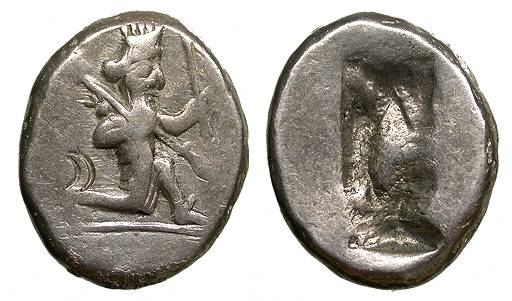
A siglos perhaps from the reign of Artaxerxes I (c.485-470 BCE)
Source:
http://www.vcoins.com/ancient/civitas/store/viewItem.asp?idProduct=8525&large=1
(downloaded Sept. 2006)
"Persia Achaeminid Kings Traditionally attributed to Artaxerxes I Circa 485-470 BC. AR Siglos 5.63g. 17mm. Persian warrior-king kneeling or running right, holding bow before, spear at side; small crescent-shaped banker's mark on obverse. Plain incuse punch."
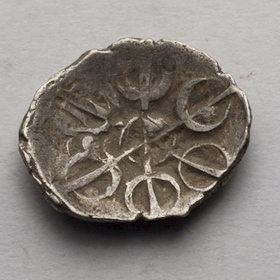 |
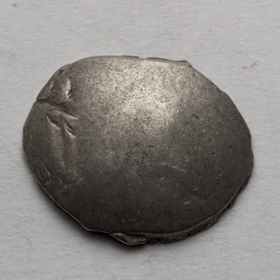 |
A silver 1/8 karshapana coin from the mint at Taxila, c.400's BCE
Source: ebay, May 2007
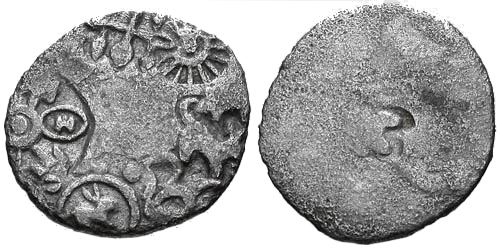
A slightly later silver karshapana, c.370-320 BCE, from Taxila
Source:
http://www.vcoins.com/ancient/ancientimports/store/viewitem.asp?idProduct=13277
(downloaded May 2007)
"Ancient India Taxila-Gandhara Mauryan denomination Silver
Karshapana
punchmark coin, 370-320 BC. Obverse: Many interesting punchmarks,
including
dog and rabbit. Reverse: Single punchmark shaped like a 3. Size: 19.36
mm. Weight: 2.6 grams."
== Indian Routes index == Indian Routes sitemap == Glossary == FWP's main page ==